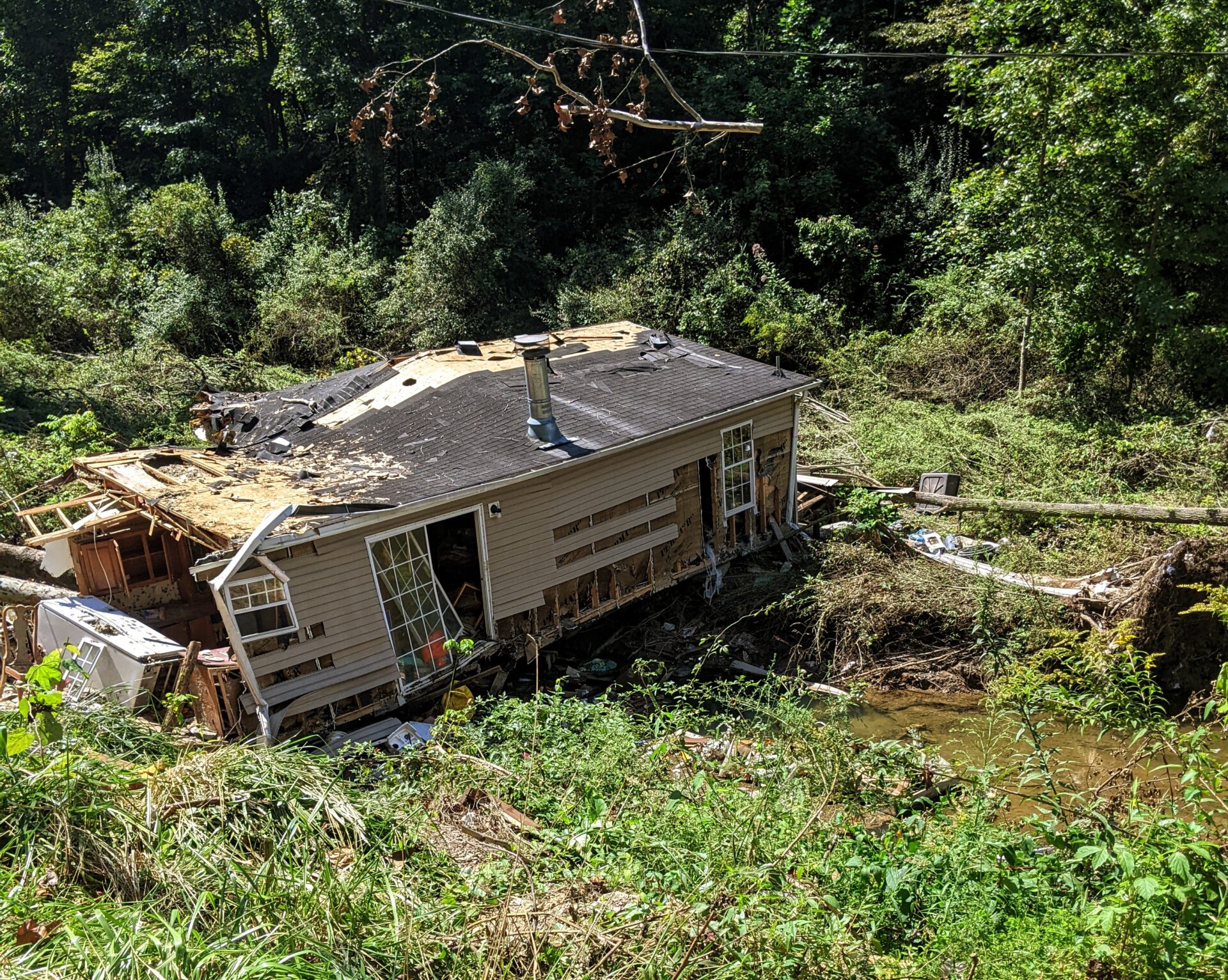This conversation originally aired in the March 5, 2023 episode of Inside Appalachia.
Katie Myers was working her first journalism job at WMMT/Appalshop when last summer’s floods struck eastern Kentucky.
Myers plunged into her work as a reporter, while also living through the flood and recovery alongside neighbors in her community. Her knowledge and rapport with local residents is evident in “Kentucky Flooding,” a 38-minute audio documentary that aired on the BBC Documentary show and podcast. It was produced by reporter Philip Reevell, who flew in from the UK to report on the flood’s aftermath.
Reevell worked closely with Myers. Since she was a local reporter, with knowledge of the area, she was able to help guide him and introduce him to people. And to powerful effect.
Inside Appalachia host Mason Adams spoke with Myers and Reevell about the process of making a documentary in this way, with one reporter from the area and another from an overseas outlet.
This interview has been edited for length and clarity.
Adams: When the Kentucky assignment came up, was it a story that came from you, Philip?
Reevell: It came from me. I’d been reading about the floods. It’s a pretty devastating story. I pitched the idea to the BBC World Service editor. And then I reached out to Katie to help us do it. And that’s how it came about.
Adams: As I understand it, Katie, WMMT/Appalshop was among those places affected by the flooding. Can you talk about what happened with the flooding in your employer?
Myers: The Kentucky River had gotten high enough to do something like that since ‘57. There was no expectation that this could happen, even in a heavy rain. We figured it would just lap at the bottom of the building, and we’d have to deal with some water damage. That day, though, I forget exactly how many feet, but it was something like six feet into the first floor. So the theater, the radio station, all of our equipment, this beautiful art we had hanging downstairs in the gallery, and all this stuff got destroyed. Our archive has decades of precious recordings and film and photographs, documenting life in Eastern Kentucky. That was very severely damaged.
Reevell: That was how I came across the story. That really resonated with me. A photo was tweeted out looking down on Appalshop and showing how high the water had risen. It was like a building within a lake of water. As time went on, we were able to connect with Katie to help us understand how the floods had affected this cultural center that had been there for over 50 years.
Adams: So you’d seen the photos, Philip, you’d corresponded with Katie and other folks. What did you see when you landed on the ground at Whitesburg?
Reevell: I arrived a few weeks after the floods. When I got there, the cleanup was still going on. Katie showed me around different areas in the town and around in the hollers, which were devastated. It was pretty shocking to see houses that had been washed away from the road. Then to see people living in tents beside the road where their home had been washed away. Or to meet people who were still clearing out a home that had been ruined, pulling up the floor or pulling down the wall. That was really pretty shocking, frankly, and upsetting to see how people’s lives have been totally turned upside down.
Adams: What strikes me when I listen to this documentary, is it’s immediately apparent that Katie has been living through the recovery. And not just that, but actively participating in the recovery efforts. Katie, can you tell us what life was like in those weeks between the flooding leading up to some of this reporting with Reevell?
Myers: I want to, first off, say that I wasn’t directly affected by this flood. I was pretty lucky. I didn’t lose anything, I didn’t lose anyone. I still had a job and still had an income, so I was much luckier than a lot of other folks. This is my first journalism job, and I still am navigating the ways it changes your relationship to people. Sometimes, like, you end up seeing everything through a lens or through the microphone instead of just as a person. There’s this fragmenting of identities that you can have as a journalist. And I was just one person. In this situation, it’s like, of course you help people. What else are you going to do? There’s nothing else to do. Everybody is trying to dig themselves out of a hole, and what kind of a person are you if you don’t try to help them out? That was what everyone was doing. And it seemed very natural to do.
Adams: What kind of response did you all see once this documentary aired?
Myers: There’s always this constant worry that eastern Kentucky will be forgotten. And just the fact that people from so far away were so interested in the place’s story, I think that really meant a lot to folks. One thing a 3:30-minute radio feature also can’t do is really let people talk. I think this piece allowed people to just just talk in it. People wanted to express and understand what had happened to them. All you had to do is ask one question, and people would just start going off because, like, nobody was going to see their therapist. You know what I mean?A lot of folks don’t have an outlet to talk through like these traumas that have just happened to them. I think being able to hear that was really powerful.
——
Listen to the full interview by clicking or tapping the “Listen” button at the top of this story, or check it out on Inside Appalachia.
The BBC Documentary, “Kentucky Flooding,” also is available to hear on the BBC.
